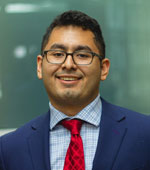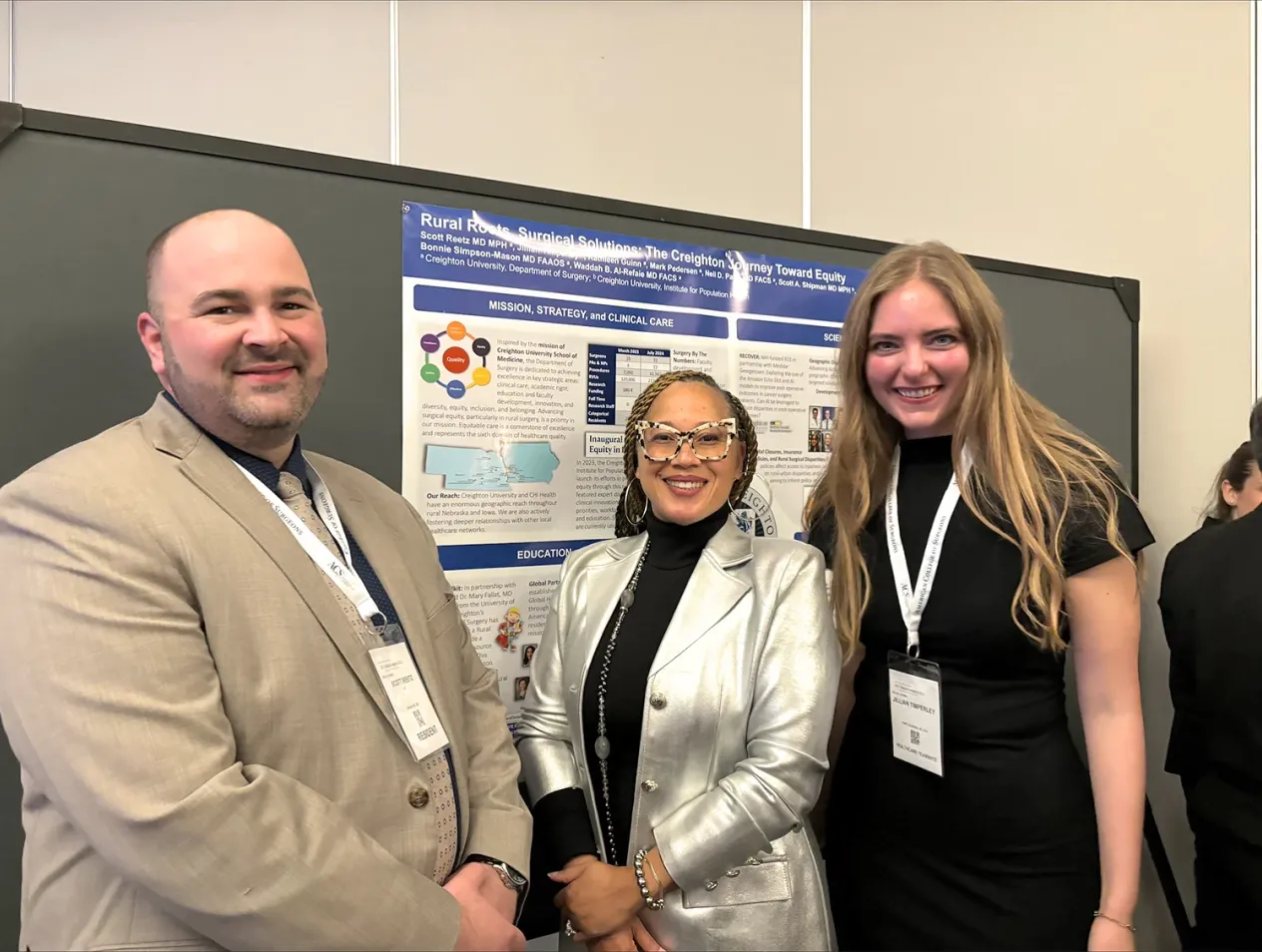
Surgery Research Opportunities
Department of Surgery Research Mission Statement
The Department of Surgery at Creighton University School of Medicine is committed to advancing the science and practice of surgery through innovative research, interdisciplinary collaboration, and a steadfast focus on improving patient outcomes and addressing health disparities. Guided by our core values of excellence, integrity, innovation, and compassion, we strive to create a culture of inquiry that empowers researchers, residents, and students to make meaningful contributions to the field of surgery and to the broader healthcare community.
Our Research Values
- Excellence in Inquiry
We are dedicated to conducting rigorous, impactful research that pushes the boundaries of surgical knowledge and practice. - Integrity and Ethical Responsibility
Our research upholds the highest standards of ethical conduct, transparency, and accountability in all aspects of investigation and dissemination. - Innovation for Tomorrow
We prioritize pioneering approaches and cutting-edge technologies to address the evolving challenges in surgery and healthcare. - Collaboration and Interdisciplinary Engagement
By fostering partnerships across disciplines and institutions, we enhance the depth and reach of our research endeavors. - Commitment to Health Equity
Our work prioritizes understanding and addressing health disparities, ensuring that advancements in surgery benefit all communities. - Mentorship and Development
We cultivate an environment that supports the growth of future surgeon-scientists, equipping them with the tools and guidance to lead transformative research.
Through these values, our mission is to not only advance surgical science but also to translate discoveries into practice, ensuring better health and healing for all.
Key Focus Areas for the Department
- Surgical Outcomes and Quality Improvement
- Investigating factors that influence surgical outcomes to enhance patient safety, reduce complications, and improve overall quality of care.
- Developing and implementing evidence-based protocols to optimize surgical processes and recovery pathways.
- Health Disparities and Access to Care
- Exploring disparities in surgical care and outcomes across diverse populations.
- Identifying barriers to access and proposing strategies to ensure equitable surgical care for all patients.
- Innovative Surgical Techniques and Technology
- Advancing minimally invasive and robotic surgery techniques.
- Integrating emerging technologies like artificial intelligence, augmented reality, and 3D printing to enhance surgical precision and training.
- Trauma and Critical Care
- Studying the management of trauma patients to improve survival rates and recovery outcomes.
- Researching advancements in critical care techniques and post-surgical support for critically ill patients.
- Surgical Oncology
- Focusing on improving surgical approaches to treat cancers effectively, including early detection and tumor resection strategies.
- Collaborating on multidisciplinary approaches to integrate surgery with other cancer therapies.
- Rural Health and Surgical Access
- Investigating challenges unique to rural populations, including limited access to surgical care and resources.
- Developing strategies to expand surgical services in rural areas, including telemedicine, mobile surgical units, and partnerships with rural healthcare facilities.
- Researching outcomes and disparities in rural surgical care to inform policy and practice.
- Surgical Education and Simulation
- Developing innovative training methods for residents and students, including simulation-based education and competency assessments.
- Conducting research on how to improve surgical education techniques and curricula to prepare the next generation of surgeons.
- Health Outcomes and Public Health Integration
- Examining how social determinants of health impact surgical outcomes and recovery.
- Bridging public health and surgery to address population-level challenges in surgical care.

Resident Research Opportunities
The Department of Surgery at Creighton University School of Medicine is dedicated to fostering a culture of inquiry and discovery among its residents. Through structured programs, mentorship, and dedicated research initiatives, residents have unparalleled opportunities to advance surgical science and improve patient care.
Opportunities to Participate in Research
Residents at all levels are encouraged to engage in meaningful research that aligns with their interests and career aspirations. Opportunities include:
- Collaborating with faculty and interdisciplinary teams on innovative research projects.
- Presenting findings at national and international conferences.
- Publishing work in leading medical journals.
These research experiences are designed to complement residents’ clinical training, preparing them for leadership roles in academic and clinical surgery.
Resident Research Curriculum
The department has established a comprehensive Resident Research Curriculum to provide structured training and support for residents engaged in research. Key elements include:
- Core Research Training: Workshops and didactic sessions covering study design, research ethics, statistical analysis, and manuscript preparation.
- Faculty Mentorship: One-on-one guidance from experienced researchers to develop and execute impactful projects.
- Conference and Publication Support: Resources and mentorship to help residents effectively present their findings and navigate the publication process.
This curriculum ensures residents acquire the foundational skills to conduct rigorous, high-impact research throughout their careers.
Creighton School of Medicine Surgery Research Fellowship
The Creighton School of Medicine Surgery Research Fellowship is a transformative opportunity for residents who wish to dedicate a full year to advancing their research goals. This fellowship is open to surgical residents who have completed their PGY-2 or PGY-3 year and offers a structured, immersive research experience.
Key Features of the Fellowship
- Dedicated Research Year: Fellows step away from clinical duties for a full year to focus exclusively on research, with limited clinical activities tailored to their needs.
- Multi-Disciplinary Mentorship: Fellows are guided by a team of seasoned mentors, fostering collaborative, cross-disciplinary research.
- MPH Certificate: Fellows earn a Master of Public Health (MPH) certificate, equipping them with advanced skills in public health and research methodology.
- Research Focus Areas: The fellowship emphasizes surgical outcomes, health disparities, and health outcomes research, ensuring that residents contribute to areas with significant clinical and societal impact.

Kathleen Guinn
Senior Research Program Coordinator
katieguinn@creighton.edu

Adrian Flores
Trauma Research Coordinator (CHI)
Assistant Clinical Professor
adrianflores1@creighton.edu

Jillian Timperley
Clinical Research Assistant II
jilliantimperley@creighton.edu

Mark Pedersen
Clinical Research Assistant II
markpedersen@creighton.edu




